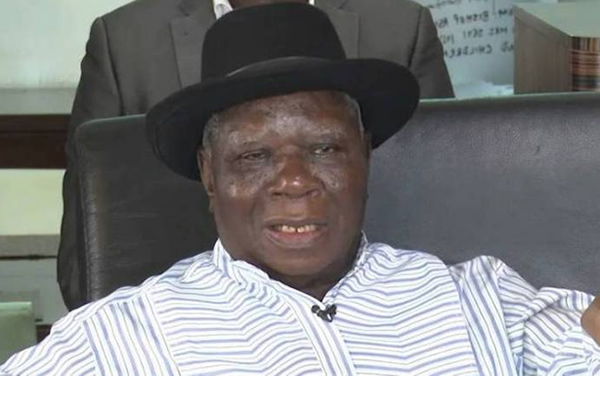Elder statesman and leader of the Pan Niger Delta Forum, Chief Edwin Clark, has called for the suspension and reform of the Nigerian Governors’ Forum.
Clark made the call in an open letter on Monday, stating that the Forum had deviated from its original purpose of fostering collaboration and had instead become a “platform for power without accountability, influence without responsibility.”
He explained that the NGF, originally established to promote inter-state cooperation, had evolved into a “cabal” capable of challenging the federal executive, manipulating the legislature, and obstructing local government autonomy.
“The NGF was born out of necessity. It was established to foster inter-state cooperation and facilitate dialogue among the governors of Nigeria’s 36 states. Its purpose was to act as a bridge between tiers of government, harmonising governance practices, exchanging ideas, and advocating for state interests within the federal framework.
“However, by the early 2010s, the NGF’s original mandate was overshadowed by a growing tendency to act as a bloc—a cabal capable of challenging the federal executive, manipulating the legislature, and stifling local government autonomy. The consequences of this transformation have been dire. My voice, my letters, my pleas—perhaps dismissed as the words of an elder in the twilight of his years—yet I persisted. I persist now because the story of the NGF, like that of Nigeria, is still being written,” the letter read.
Allegations of Overreach
Highlighting instances of the Forum’s alleged overreach, the Ijaw leader accused the NGF of reducing state assemblies to mere extensions of the executive. He noted that speakers and assembly members were often handpicked by governors to ensure unwavering loyalty.
He said, “The NGF’s manipulation of legislative processes is equally troubling. Governors often manoeuvre federal candidates, particularly senators, to safeguard their future political interests. The Senate, rather than being a chamber of independent thought, becomes a retirement plan for ex-governors.
“When will we see legislatures that reflect the will of the people rather than the interests of governors? How can we rebuild these institutions to function as true checks and balances?”
Clark described the NGF as a “notorious cabal” with a reputation for secrecy, resistance to reforms, and prioritising power over service. However, he expressed hope that with meaningful reforms, the NGF could still become a force for good.
Call for Reform and Reconstitution
The elder statesman called for the suspension and reconstitution of the NGF, stating that reform would offer an opportunity “to recalibrate, recommit, and rebuild.”
“Let us imagine a reconstituted NGF—one that aligns with constitutional principles, serves as a true platform for collaboration rather than control, and prioritises the people over politics.
“Reform is not an indictment; it is an opportunity—a chance to recalibrate, recommit, and rebuild. Fellow Nigerians, the NGF stands at a crossroads. Its survival, and ours, depends on its willingness to reform and align with the principles of democracy and good governance,” he said.
Clark warned that failure to reform the NGF could lead to a looming crisis, urging the Forum to embrace change to avert further division among Nigeria’s various levels of government.
